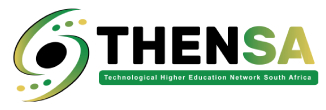The Durban University of Technology (DUT) will open its doors to 300 young girls from the deep rural schools across KwaZulu-Natal to help them acquire coding and robotic skills, which will assist them to one day thrive as Science, Technology, Engineering and Mathematics (STEM) entrepreneurs and executives.
This was revealed at the launch of the Code Like A Girl 2020 programme held at the Inkosi Albert Luthuli International Convention Centre (ICC) last Thursday, 12 November 2020.
The programme is a joint initiative between DUT, Vodacom, KwaZulu-Natal Department of Education and the Centre for the Advancement of Science and Mathematics Education (CASME).
Outlining the objectives of the partnership, DUT’s Deputy Vice-Chancellor: Research, Innovation and Engagement, Professor Sibusiso Moyo said for DUT coding is key because it exposes the girls who are more than 50% of the population.
“If they are not trained, they will be left out to be active players in our economy because they would not have excess to higher education in the right areas. This opportunity to do coding gives a chance to all of our potential students to be able to have access to the right skills within the higher education sector. It also gives them a chance to become active players within our economy. I would like to acknowledge the Department of Education, CASME, Vodacom especially for driving this programme and for approaching DUT,” said Prof Moyo.
She also acknowledged DUT’s Senior ICT lecturer, Ebrahim Asmal and his team for ensuring that the launch was a success.
Furthermore, Prof Moyo said the network connectivity challenge in the province needs to be addressed to ensure that everyone can access the same type of education, exposure and skills, despite where they come from.
She also said that DUT is excited and is looking forward to receiving the 300 students from 12 districts in KwaZulu-Natal.
KZN MEC for Education, Kwazi Mshengu said this is a programme aimed at taking young girls from deep rural areas in different schools across the province and exposing them into skills that are related to coding and robotics.
“We are going to start with a group of 300 hundred learners which will be taken across the province during the December holidays. We had hoped that we would start with about 900 but due to COVID-19 regulations we have reduced it to 300 learners. In the ensuing years we are going to expand this programme. It is a very important programme because it gives exposure to these young girls who are in deep rural areas, who are not exposed to major things that are happening around the society. We are giving them an opportunity to be exposed, and at the end of the programme they would have the basic skills around coding and robotics,” said Mshengu.
He said as the Department of Education they are happy that in 2021, they will be starting to pilot the subject of coding and robotics, with the hope that by 2022 it will be offered as a subject in the public schools.
Vodacom KZN Managing Executive, Chris Lazarus acknowledged DUT and said he is pleased to work with the institution that is localised within KwaZulu-Natal and has the passion of the province at heart.
He introduced last year’s Code Like A Girl 2019 Alumni, Zothile Ncube who is a grade 10 learner at Hlahlindlela High School at KwaNgcolosi, near Hillcrest.
“We are going to take children from the Valley of a 1000 Hills and all the other 12 districts and make them relevant not only in South Africa, but we are making them relevant globally. We have an opportunity for the first time as long as we have connectivity, to say we no longer need to follow America in terms of not having access to the same amount of content,” said Lazarus.
Ncube thanked Vodacom for giving her school an opportunity to learn coding, which has helped her to change her outlook on Information and Communications Technology (ICT) careers. Coding has helped her to learn how to create a website, a task she feels every youth should know, especially since technology is now being used to do a lot of things. She said Vodacom sponsored them with laptops, cell phones and Wi-Fi routers which are helping them when doing schoolwork.
Representing the Centre for the Advancement of Science and Mathematics Education (CASME), Henre Benson said in Science, Technology, Engineering, and Mathematics (STEM) girls are underrepresented and this is a wonderful opportunity to close that gap.
He commended teachers for reaching out to their learners through all kinds of different platforms during this difficult time of COVID-19 lockdown, using technology to continue the learning journey.
“Technology is fundamental to what we are going to close these gaps. Code Like A Girl is a significant part of that story. We really need to have society see science as providing solutions. This is an opportunity for us expand this initiative even beyond our wildest expectations,” said Benson.
Pictured: DUT’s Deputy Vice-Chancellor Prof Sibusiso Moyo.
Pictured 2: Code Like A Girl 2019 Alumni, Zothile Ncube.



